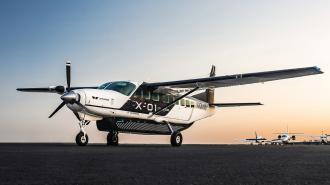San Francisco-based autonomous flight startup Xwing (unfortunately, no, not that kind) has taken a crucial step towards crewless cargo flights, according to Axios’ Alex Fitzpatrick.
The company has filed a document called a Project Specific Certification Plan with the Federal Aviation Administration (FAA), getting the ball rolling towards getting approval for Xwing to run crewless commercial cargo flights. This is the same regulatory pathway that normal cargo and passenger planes take, Fitzpatrick reported — with all of the onus on safety that comes with it.
“Nobody else out there has put the whole package together for something that can actually meet the existing safety standards,” Earl Lawrence, chief compliance and quality officer at Xwing, told Fitzpatrick.
S-foils engaged: Rather than building a new plane, Xwing’s “Superpilot” autonomous flight tech is integrated into existing planes. Once installed, it uses a suite of machine learning algorithms as well as detect-and-avoid sensors to guide the plane and communicate with air traffic control.
Superpilot has already made a “gate-to-gate” autonomous flight, leaving out of, and returning back to, an airport in Concord, California in February of 2021, using an outfitted Cessna Grand Caravan 208B.
As Fitzpatrick pointed out, Xwing’s ability to turn commercial aircraft crewless may provide it an advantage in getting autonomous flight, ahem, off the ground; planes like the Grand Caravan are familiar to regulators and air traffic controllers, with proven track records.
Caravan in the sky: The company’s been flying cargo routes using piloted Grand Caravans since 2020, expanding their fleet to 35 planes operating out of 58 airports and flying up to hundreds of flights per day in 2022, FutureFlight reported. Those piloted commercial cargo flights play an important role in Xwing’s autonomous flight plans.
The flights “collect data at scale across all geographies and weather environments,” Marc Piette, Xwing founder and CEO, told FutureFlight.
“It also feeds into the training of algorithms, especially machine learning algorithms, whether it be deep neural nets or otherwise because we can collect data across all these routes and all of these operations.”
Eventually, if Superpilot gets regulatory approval, Xwing’s ground-based operators could eventually be managing multiple uncrewed flights, with the hope of improving frequency and efficiency — it’s designed to take routes that optimize fuel use — as well as revitalizing under-used, smaller airports.
The startup believes Superpilot will make flights safer overall and during their most dangerous phases — taxiing, takeoff, and landing — Robotics & Automation News reported.
Not quite ready for takeoff: Although the FAA filing is the first of its kind — and the first step towards approval — getting the nod for certification can take years, and the FAA is still hashing out how to handle autonomous flight more broadly, Fitzpatrick noted.
Xwing plans to focus on developing Superpilot solely for the Grand Caravan, although they plan on expanding into other models once they receive regulatory approval, Piette told FutureFlight.
The startup sees the approval of Superpilot as a major shakeup, if it happens.
“Autonomous flight is, in our books, as transformative an innovation for the industry as the jet engine,” Piette told Fitzpatrick.
We’d love to hear from you! If you have a comment about this article or if you have a tip for a future Freethink story, please email us at tips@freethink.com.
